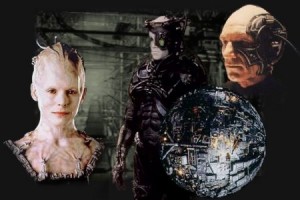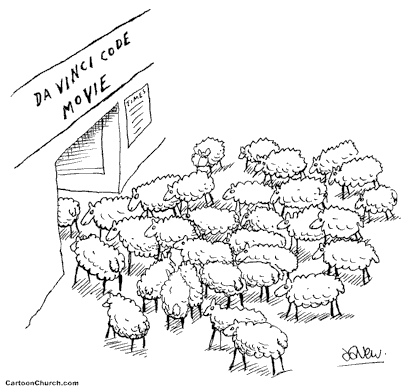This IS a smart mob (albeit, not a nice one!)

And this is a brief interview with Howard Rheingold, who coined the term “smart mob” in his book of the same title. In this interview Rheingold discusses the importance of libraries in their role of aiding learners to be smart in a 21st century sense — able to find the information they need and able to determine that the information they find is reliable.
Internet Librarian 2008: Howard Rheingold from Jaap van de Geer on Vimeo.
So exactly what is a smart mob? Wikipedia says, “A smart mob is a group that, contrary to the usual connotations of a mob, behaves intelligently or efficiently because of its exponentially increasing network links. This network enables people to connect to information and others, allowing a form of social coordination.”
The illustration of the Borg above to me is the extreme illustration of this idea of collective intelligence, as in the TV series Star Trek: Next Generation the Borg was a group of people part-human, part-machine who knew one another’s thoughts and worked as a single unit. As a smart mob the Borg was incredibly efficient; social media was directly programmed into its consciousness!
In terms of our current reality as teacher librarians, Rheingold wrote an article for the Harvard Business Review blog in which he gave a self-described ‘rant’ about the importance of teaching about social media. “Learning to use online forums, be they social network services like MySpace and Facebook, blogs, or wikis is not a sexily contemporary add-on to the curriculum – it’s an essential part of the literacy today’s youth require for the world they inhabit.”
He further says, “Whether digital media will be beneficial or destructive in the long run doesn’t depend on the technologies, but on the literacy of those who use them.” Rheingold has found that today’s students, although they may be “digital natives,” do not necessarily have the literacy skills they need. He says, “learning the skills of effective social media use requires an education that today’s institutions and teachers are ill-prepared to provide.” He is developing a software program that integrates forums, blogs, wikis, and other social media, allowing the “smart mob” to direct its own learning.
Discovering the term “smart mob” helped me see the true power of the wiki. In their article, “An Information Skills Workout: Wikis and Collaborative Writing,” Lamb and Johnson say that “Wikis are a specific type of social technology involving cooperation, interdependence, and synergy.” Instead of providing the content, we as teachers can work with our students (and our colleagues too) to collaboratively create the content. We allow our students to become the smart mob. Lamb and Johnson point out that wikis are best for creative, original works, not just regurgitating what is already out there. As teachers we must ask students, “How will your project contribute in some unique way to the body of information already on the Internet?”
In his article in Gifted Child Today, Working With Wikis, Del Siegle addresses some common concerns with using wikis, and especially with Wikipedia. These include inaccurate, out-dated, or biased information, as well as missing information. He points out that generally with Wikipedia these problems are usually quickly corrected. I especially like this quote: ‘Few would doubt that “all of us know more than any one of us.” Whether all of us can jointly produce documents of equal or higher validity than those produced with traditional publishing practices is a social experiment in which our students are embedded. Educators can help their gifted students understand this debate and use it as discussion fodder as they help students develop and use wikis.’ Of course, I believe that this smart mob mind construct is not limited to gifted children.
While creating a wiki can seem quite a challenge, there is lots of help available. Shonda Brisco analyzes three different wiki applications in the article WHICH WIKI IS RIGHT FOR YOU? I tried out the three she suggested, PBWiki, Wikispaces, and WetPaint.
Despite the fact that using any of these wiki applications is supposed to be incredibly easy, while using Wikispaces I managed to delete one page three times before I finally switched applications. I found Wetpaint easier for me than PBWiki, so I built my wiki at http://onlinereading.wetpaint.com/. It is titled Reading the Internet: Skills for the Information Age. I had intended to create something entirely new but decided instead to rework a professional development session I had done in partnership with Margo Johnston, a fellow teacher-librarian (and incidentally, my mentor) for staff and parents into a wiki. It is in fact a work in progress, and I really like some of the Wetpaint features, including the To-Do List. You can make a note as to what needs to be done to a page next. I have some more changes to make for our discussion on reading and web 2.0 on Wednesday.
At the moment this wiki is me, not us, as I don’t have a smart mob working on it. Any volunteers out there?

